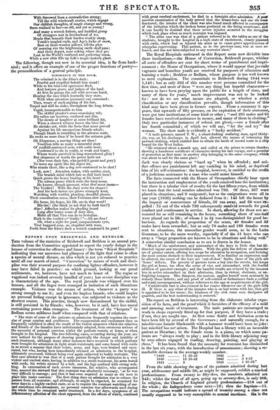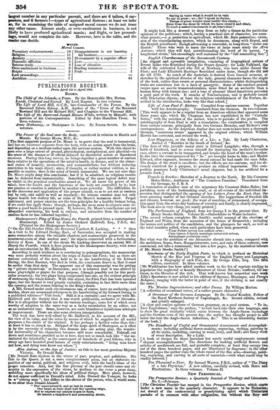REPORT UPON BEIDEWELL AND BETHLEM.
Tins volume of the statistics of Bridewell and Bethlem is an annual pro- duction from the Committee appointed to report the yearly doings in the houses of correction for offences and lunacy : the term "Royal Hospitals " indicating that our ancestors had glimpses of the light that crime is often a species of mental disease, an idea which is not yet reduced to practice amid all our march of mind. " Correction" by means of work and disci- pline was their avowed purpose for confining lighter offenders, however it may have failed in practice : on which ground, looking at our penal settlements, we, however, have not much to boast of. The rogue or vagabond was indeed severely handled of yore; but severe discipline was a characteristic of the age. The royal juvenile was whipped over his lessons, and all the lieges were scourged in imitation of such illustrious example. Violence was the means of action, whenever a party was strong enough to use it; and even the hapless lunatic, who could inspire no personal feeling except in ignorance, was subjected to violence as the shortest course. This practice, though now discontinued by the skilful, is still persisted in by friends; who, however, be it said, have less moral restraining power than strangers. The treatment of the "keepers" in Bedlam seems mildness itself when compared with that of relations.
" The state of some of the patients on admission frequently requires the exer- cise of great caution and gentleness. The exasperation and excitement then so frequently exhibited is often the result of the violent measures which the relatives and friends of the lunatics have unfortunately adopted, from erroneous notions of the necessity of personal coercion, whilst the patients remain at home, or when brought to the hospital. The two following cases, occurring during the year, are now noticed for the purpose of showing practically the danger and inutility of such treatment, although many other instances have occurred in which patients were brought for admission in tight strait-waistcoats, and some bound with cords in so severe a manner that their wrists, arms, and legs, were bruised and exco- riated, but who, having been immediately released on admission to the hospital, ultimately recovered, without being ever again subjected to bodily restraint. The first case alluded to was that of a male patient brought for admission in a very violent and excited state, having, in addition to a strait-waistcoat, his arms bound with cords, his wrists secured by a belt, and his legs confined with strong web- bing. In extenuation of such severe measures, his relative, who accompanied him, assured the steward that this restraint was absolutely necessary, as he was very difficult to manage; and that it had even required as many as six men to place him under coercion: The fast thing done on admission was to release the patient from all restraint; and although, as might be expected, he remained for some days in a highly-excited state, so as to require the constant watching of one and sometimes two attendants, no personal coercion was afterwards used during the whole time he remained under treatment. In a few days, symptoms of an inflammatory affection of the chest appeared, from the effects of which, combined with great cerebral excitement, he died in a fortnight after admirion. A poet mortem examination of the body proved that the breast-bone and one rib were fractured; the interior of the chest was also found much affected in consequence of the irritation which the broken bones produced on the liningmembrane- liud it can hardly be doubted that these severe injuries occurred in the struggle which which took iplace when so much restraint was imposed. " The other case was that of a patient referred to in the tables as one the students, brought to the hospital in a high state of excitement, closely pinioned with cards, which had so injured his arms as to cause grave apprehensions of erisypelas supervening. This patient, as in the previous case, was at once re- leased, and has not been subjected to any restraint since."
The Royal Hospitals embraced in this Report seem now divisible into three institutions,—the House of Correction, Bridewell proper, whither all sorts of offenders are sent for short terms of punishment and impri- sonment ; the House of Occupations, where it would appear that juvenile vagrants and homeless youth are received for purposes of education and learning a trade ; Bethlem or Bedlam, whose purpose is too well known to need explanation. The committals to Bridewell during 1844 were 1,143; but as only 502 of this number were persons committed for the first time, and most of these " were any thing but hopeful characters— known to have been preying upon the public for a length of time, and many of them for years," much improvement was not to be looked for : nor do we see what means are adopted, or whether a strict classification or any classification prevails, though information of this kind may have been given in former reports. From a summary it ap- pears, that upwards of fifty persons, on the expiration of their sentences, were got into institutions of some kind or other ; " and 291 males and 61 females have received assistance in money, and many of them in clothing." Only two particular instances of reform are given,--one a female after her fourth committal ; of which we will say, " let the end try " the woman. The show male is evidently a " lucky accident."
"A male prisoner, named T. W., a smart-looking seafaring man, aged thirty- six, was, on -his discharge, hi April last, allowed the means of redeeming his pawned clothing, which enabled him to obtain the berth of second mate in a ship bound for the West Indies.
" He returned about a month ago, and called at the prison to return thanks; showing a handsome certificate of character during his last voyage, and a promise of promotion as first mate in another ship belonging to the same company, which was about to sail for the same place."
Jack was clearly ebrious or " hard up " when he offended ; and nei- ther offence nor punislunent left any rankling in bis mind, or deprived him of his self-estimation : the hospital, however, is entitled to the credit of a judicious assistance to a man who could assist himself.
The facts connected with the House of Occupations chiefly bear upon the instruction and employment of the youth received into the institution; but there is a tabular view of results for the last fifteen years, from which, we learn that the total number admitted was 793. Of these, 267 were placed in situations, and 9 emigrated; but as the emigrations were all in one year (1830) nothing can be deduced from it: 145 left the house by the request or concurrence of friends, 56 ran away, and 68 were ex- pelled : 75 out of the whole 793 subsequently received rewards for good conduct and continuance in service. In short, allowing for those not ac- counted for or still remaining in the house, something short of one-half were placed out in life ; of whom 1 in 3f was distinguished for good be- haviour. As regards the proportion of the sexes, 40 females and 35 males have been rewarded; but as only 78 males and 189 females were sent to situations, the masculine gender would seem, as in the Latin Grammar, to be the more worthy, especially if of the 51 boys who ran. away a "large proportion are known to be in situations and doing well:" A somewhat similar conclusion as to sex is drawn in the house.
"Much of the misfortunes and misconduct of the boys is little else but ill- directed vigour and uncontrolled habits. With the girls the defects of character are of greater extent, offering less scope for alteration by occupation, and forming the most serious obstacle to their improvement. If so familiar an expression may be allowed, the errors of the boys are 'out-of-door' faults, those of the girls are home' defects. The poverty of parents turns a boy into the streets, but keeps-
the girl at home, too often the scene of vice and misconduct, with the fear thl addition of parental example; and the baneful results are evinced by the inmates less in active misconduct on their admission, than in violent, obstinate, or un- forgiving tempers. Mrs. Simpson, the matron, applies herself most anxiously to remedy these defects; and any proof of self-control or forbearance finds a cordial and ready encouragement, without reference to the age or acquirements of the girL " Considerable tact is also evinced in her course whenever one of the girls falls ill. If there is any other of the inmates who is on bad terms with her, that girl is appointed to be her nurse; the kindness of the sick room soon dissipates all quarrels, and the best understanding is restored.'
The report on Bethlem is interesting from the elaborate tabular expo- sition of its facts, and the proof which it furnishes of the efficacy of a mild and amusing mode of treatment. The male patients are encouraged to work in shops expressly fitted up for that purpose, if they have a trade; if not, they are taught one. At first some doubt and hesitation seem to have been felt by several of the Governors ; and naturally enough, for a mischievous lunatic blacksmith with a hammer would have been no joke: but mischief has not arisen. The Hospital has a library with an incurable patient as librarian ' • in the female room is a piano, on which some pa- tients are "always ready to play ; and in the little library adjoining may be seen others engaged in reading, drawing, painting, and playing at chess." It has been found that the necessity for restraint has diminished in the last six years, with the introduction of amusements ; showing a re- markable decrease in the average weekly number. 11 33-52 "1839 1842 3 13 20-52
1840 1843 3 4-52 1841 9 1844 1 35-52."
From the table showing the ages of the patients admitted during kit year, adolescence and middle life, as might be supposed, exhibit a marked predominance. From twenty to fifty-five, the numbers admitted are 243; whilst the total of all ages, going up to seventy-five, is only 286. In religion, the Church of England greatly predominates-218 out of the whole ; the Independents come next-19 ; then the Baptists-1l. The occupations would indicate a spread of insanity among a class not usually supposed to be very susceptible to mental emotions. Six is the
largest number in any particular pursuit, and there are 6 tailors, 6 car- pesters, and 6 farmers !—types of agricultural distress ; at least we infer so, for in examining the table of assigned moral causes we do not trace any other cause. Intense study, or over-excitement in business, is not likely to have produced agricultural mania; and fright, or law proceed- /Egg, *would not complete the tale. However, here is the table, and the reader tau decide.
ALUMS. Moral Causes.
Pecuniary embarrassment 18 Disappointment in not learning
Religion 11 his business 1 Anxiety.. . - 10 Ill-treatment by &superior of 1
Domestic affliction
5 Love ..... ..... 1 Intense study 8 Loss of situation 1
Over-excitement in business 8 Reading romances 1 Fright 2 Pride
1
Law proceedings 2
—
Ambition ......-........ ...............
1
a



























 Previous page
Previous page